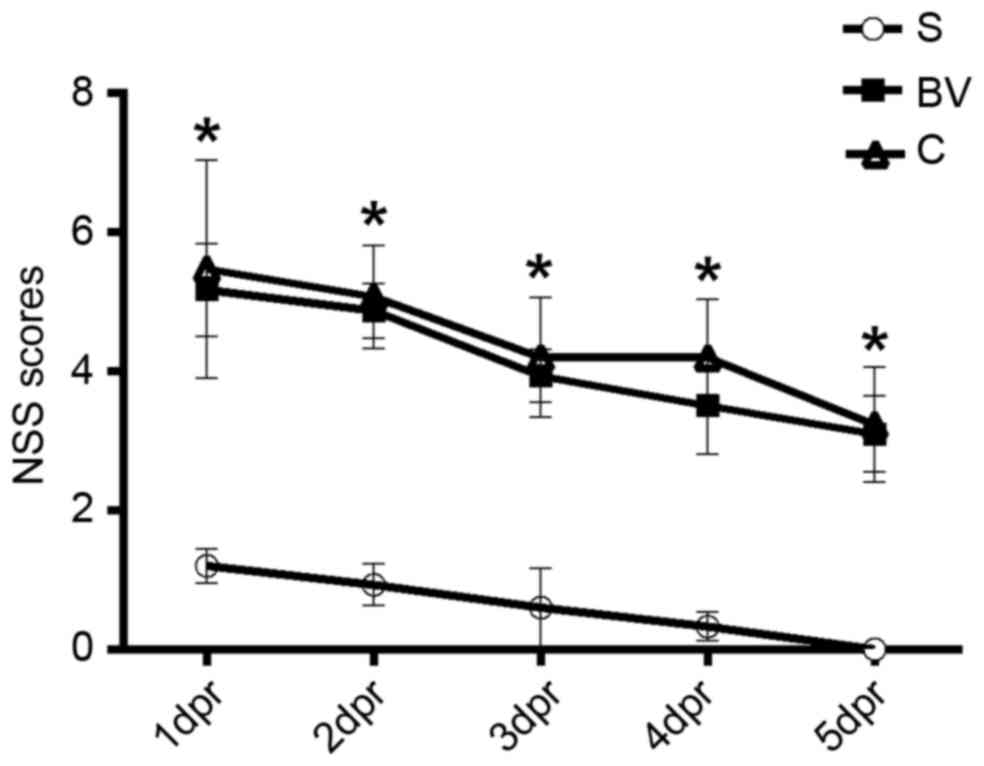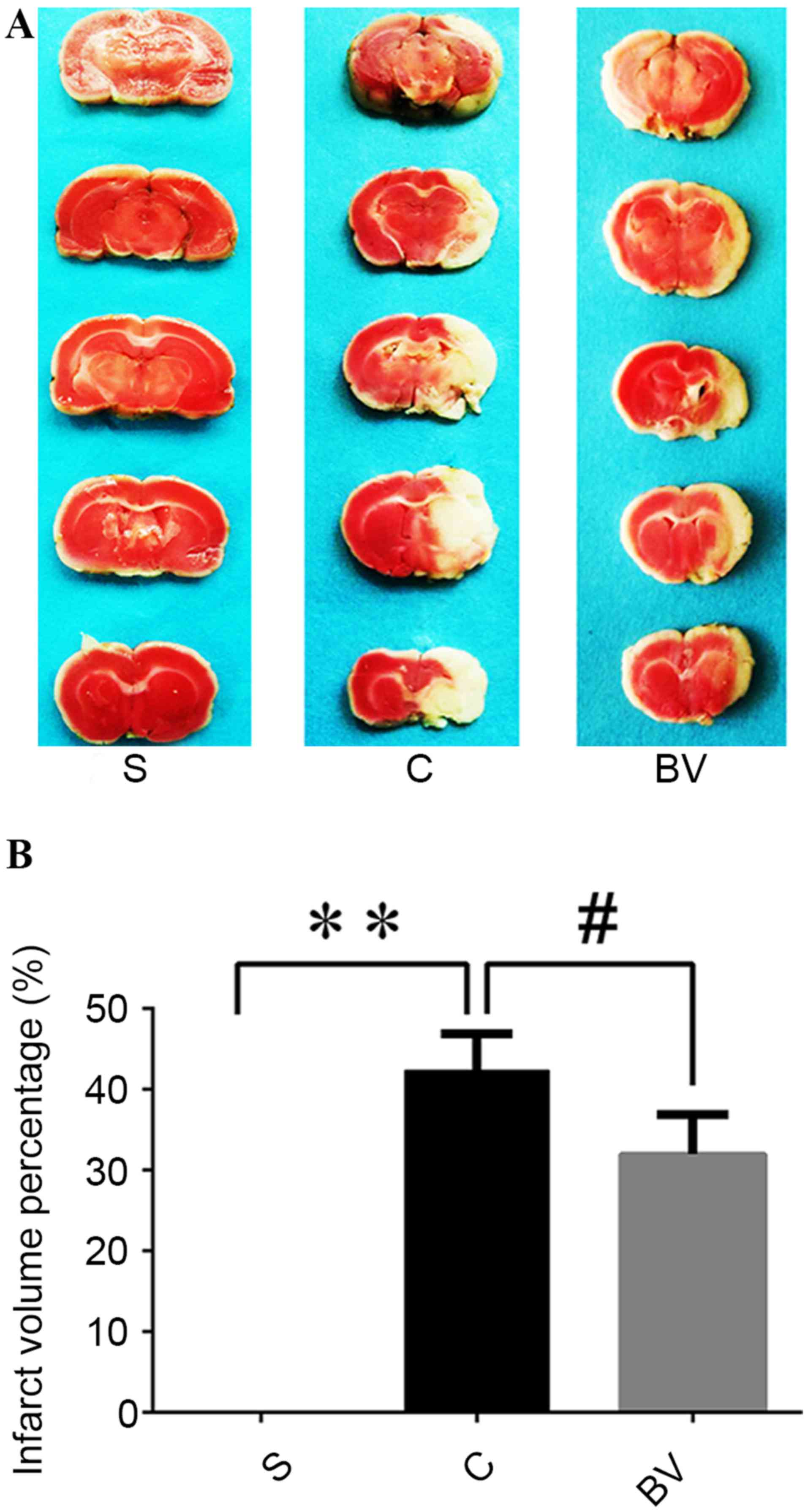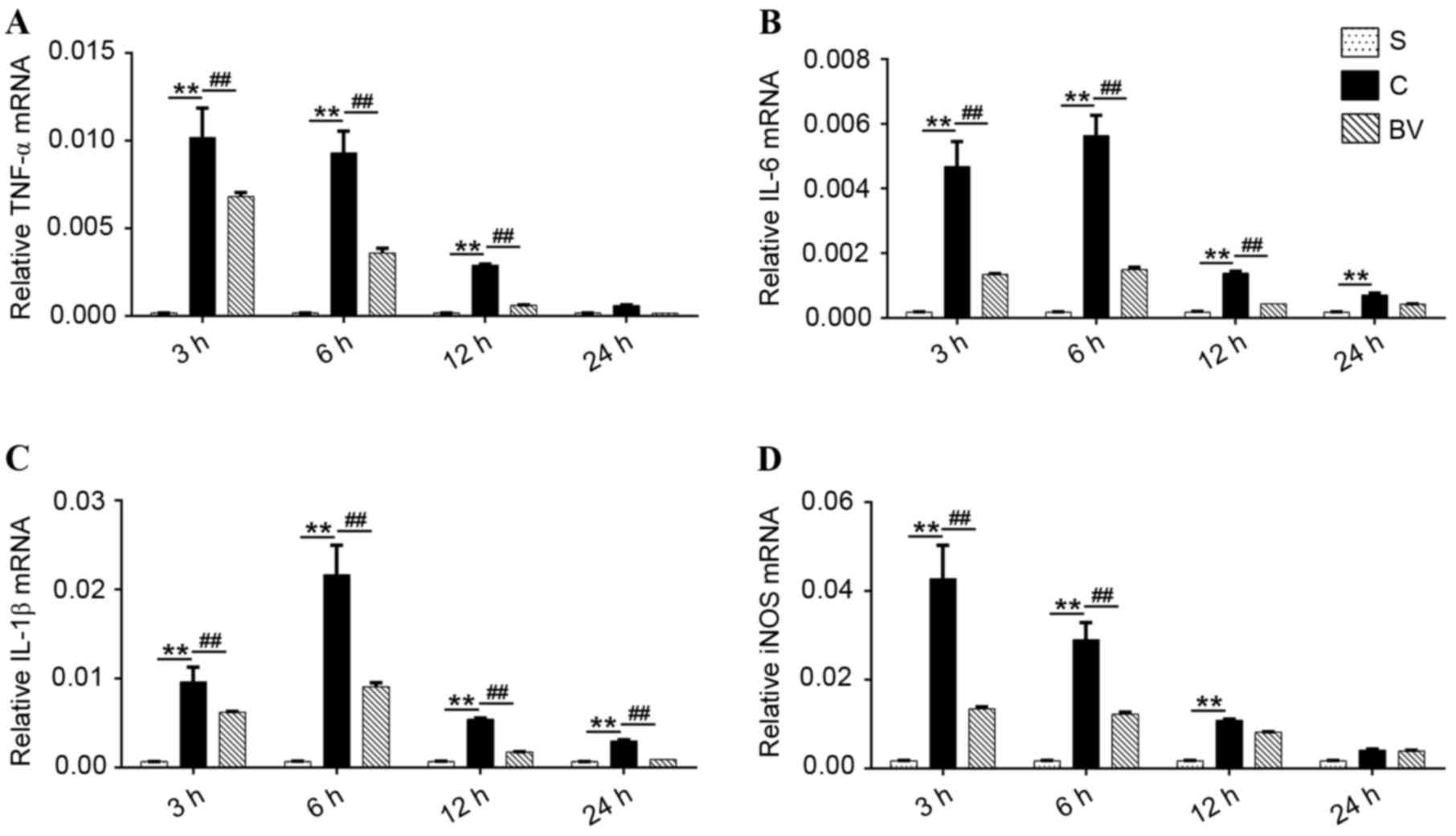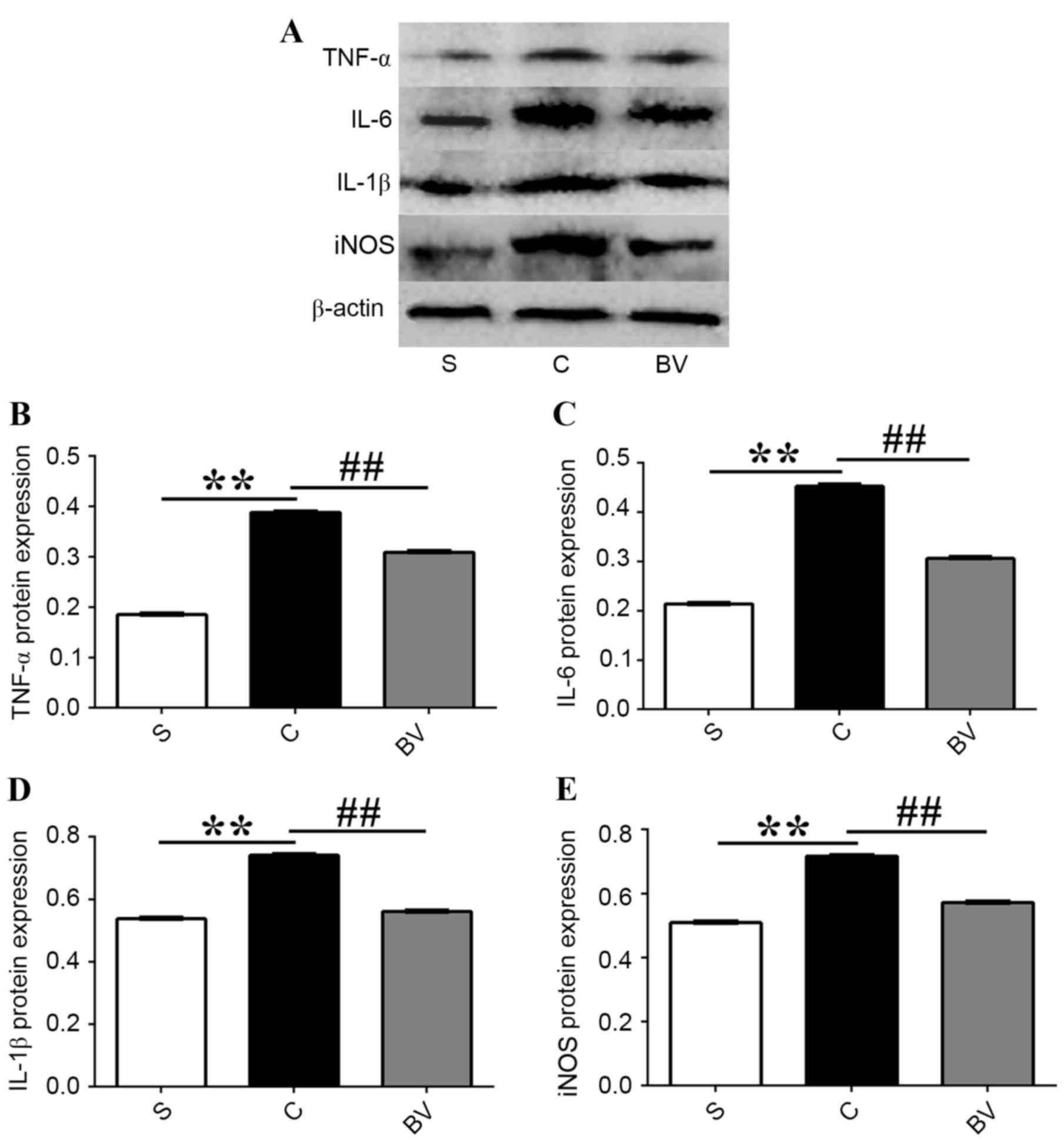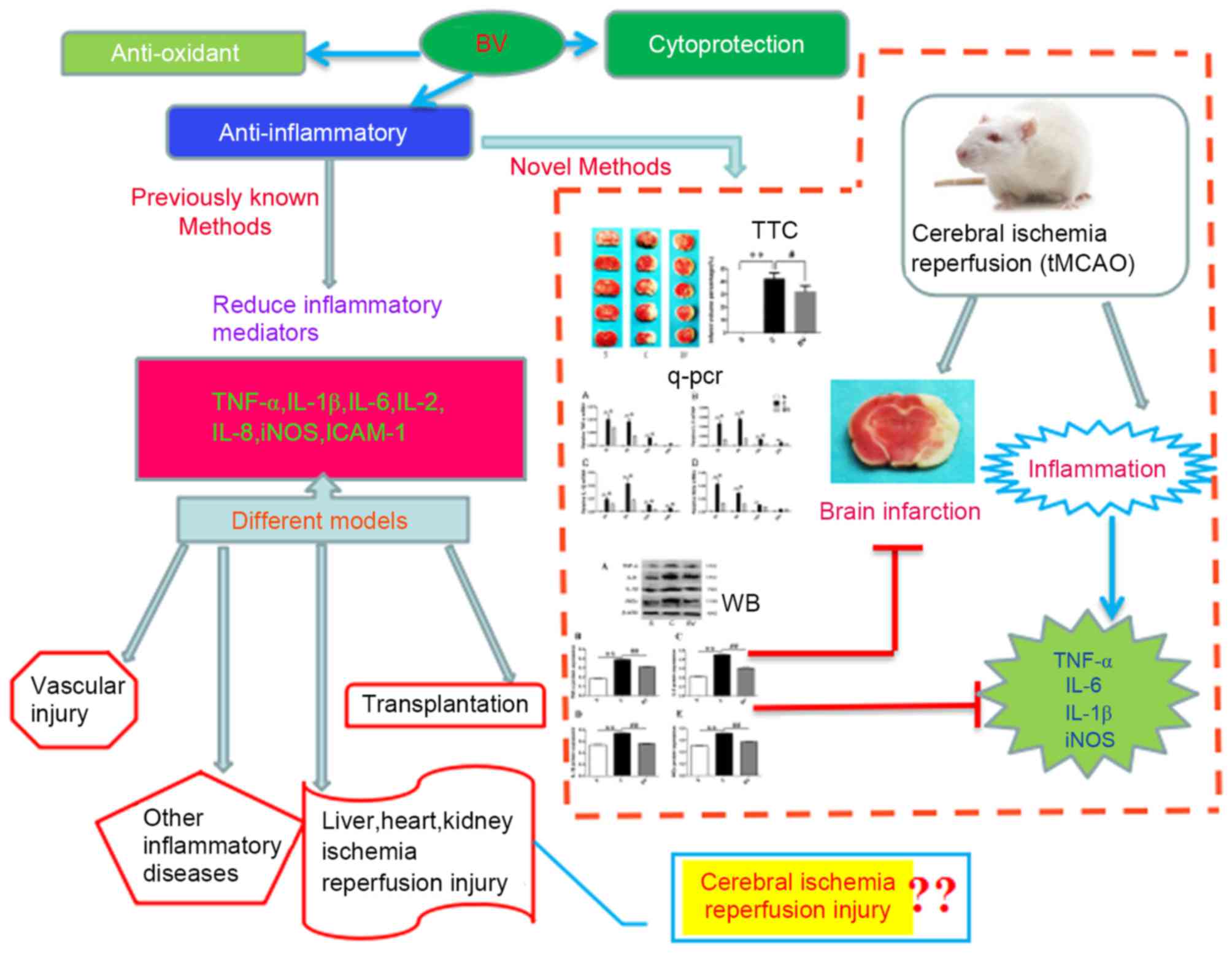|
1
|
Zhang M, Wang S, Mao L, Leak RK, Shi Y,
Zhang W, Hu X, Sun B, Cao G, Gao Y, et al: Omega-3 fatty acids
protect the brain against ischemic injury by activating Nrf2 and
upregulating heme oxygenase 1. J Neurosci. 34:1903–1915. 2014.
View Article : Google Scholar : PubMed/NCBI
|
|
2
|
Zhao Y, Fu B, Zhang X, Zhao T, Chen L,
Zhang J and Wang X: Paeonol pretreatment attenuates cerebral
ischemic injury via upregulating expression of pAkt, Nrf2, HO-1 and
ameliorating BBB permeability in mice. Brain Res Bull. 109:61–67.
2014. View Article : Google Scholar : PubMed/NCBI
|
|
3
|
Sanderson TH, Reynolds CA, Kumar R,
Przyklenk K and Huttemann M: Molecular mechanisms of
ischemia-reperfusion injury in brain: Pivotal role of the
mitochondrial membrane potential in reactive oxygen species
generation. Mol Neurobiol. 47:9–23. 2013. View Article : Google Scholar : PubMed/NCBI
|
|
4
|
Tuma RF and Steffens S: Targeting the
endocannabinod system to limit myocardial and cerebral ischemic and
reperfusion injury. Curr Pharm Biotechnol. 13:46–58. 2012.
View Article : Google Scholar : PubMed/NCBI
|
|
5
|
Ishibashi N, Prokopenko O, Reuhl KR and
Mirochnitchenko O: Inflammatory response and glutathione peroxidase
in a model of stroke. J Immunol. 168:1926–1933. 2002. View Article : Google Scholar : PubMed/NCBI
|
|
6
|
Pan J, Konstas AA, Bateman B, Ortolano GA
and Pile-Spellman J: Reperfusion injury following cerebral
ischemia: Pathophysiology, MR imaging, and potential therapies.
Neuroradiology. 49:93–102. 2007. View Article : Google Scholar : PubMed/NCBI
|
|
7
|
Cai F, Li CR, Wu JL, Chen JG, Liu C, Min
Q, Yu W, Ouyang CH and Chen JH: Theaflavin ameliorates cerebral
ischemia-reperfusion injury in rats through its anti-inflammatory
effect and modulation of STAT-1. Mediators Inflamm. 2006:304902006.
View Article : Google Scholar : PubMed/NCBI
|
|
8
|
Amantea D, Nappi G, Bernardi G, Bagetta G
and Corasaniti MT: Post-ischemia brain damage: Pathophysiology and
role of inflammatory mediators. FEBS J. 276:13–26. 2009. View Article : Google Scholar : PubMed/NCBI
|
|
9
|
Beech JS, Reckless J, Mosedale DE,
Grainger DJ, Williams SC and Menon DK: Neuroprotection in
ischemia-reperfusion injury: An antiinflammatory approach using a
novel broad-spectrum chemokine inhibitor. J Cereb Blood Flow Metab.
21:683–689. 2001. View Article : Google Scholar : PubMed/NCBI
|
|
10
|
Chen L, Wang L, Zhang X, Cui L, Xing Y,
Dong L, Liu Z, Li Y, Zhang X, Wang C, et al: The protection by
octreotide against experimental ischemic stroke: Up-regulated
transcription factor Nrf2, HO-1 and down-regulated NF-κB
expression. Brain Res. 1475:80–87. 2012. View Article : Google Scholar : PubMed/NCBI
|
|
11
|
Frangogiannis NG: Chemokines in ischemia
and reperfusion. Thromb Haemost. 97:738–747. 2007.PubMed/NCBI
|
|
12
|
Wong CH and Crack PJ: Modulation of
neuro-inflammation and vascular response by oxidative stress
following cerebral ischemia-reperfusion injury. Curr Med Chem.
15:1–14. 2008. View Article : Google Scholar : PubMed/NCBI
|
|
13
|
Berti R, Williams AJ, Moffett JR, Hale SL,
Velarde LC, Elliott PJ, Yao C, Dave JR and Tortella FC:
Quantitative real-time RT-PCR analysis of inflammatory gene
expression associated with ischemia-reperfusion brain injury. J
Cereb Blood Flow Metab. 22:1068–1079. 2002. View Article : Google Scholar : PubMed/NCBI
|
|
14
|
Hill-Kapturczak N, Jarmi T and Agarwal A:
Growth factors and heme oxygenase-1: Perspectives in physiology and
pathophysiology. Antioxid Redox Signal. 9:2197–2207. 2007.
View Article : Google Scholar : PubMed/NCBI
|
|
15
|
Sharp FR, Zhan X and Liu DZ: Heat shock
proteins in the brain: Role of Hsp70, Hsp 27 and HO-1 (Hsp32) and
their therapeutic potential. Transl Stroke Res. 4:685–692. 2013.
View Article : Google Scholar : PubMed/NCBI
|
|
16
|
Liang C, Cang J, Wang H and Xue Z:
Propofol attenuates cerebral ischemia/reperfusion injury partially
using heme oxygenase-1. J Neurosurg Anesthesiol. 25:311–316. 2013.
View Article : Google Scholar : PubMed/NCBI
|
|
17
|
Yang Y, Wang J, Li Y, Fan C, Jiang S, Zhao
L, Di S, Xin Z, Wang B, Wu G, et al: HO-1 Signaling activation by
pterostilbene treatment attenuates mitochondrial oxidative damage
induced by cerebral ischemia reperfusion injury. Mol Neurobiol.
53:2339–2353. 2016. View Article : Google Scholar : PubMed/NCBI
|
|
18
|
Yang Y, Li X, Zhang L, Liu L, Jing G and
Cai H: Ginsenoside Rg1 suppressed inflammation and neuron apoptosis
by activating PPARγ/HO-1 in hippocampus in rat model of cerebral
ischemia-reperfusion injury. Int J Clin Exp Pathol. 8:2484–2494.
2015.PubMed/NCBI
|
|
19
|
Sarady-Andrews JK, Liu F, Gallo D, Nakao
A, Overhaus M, Ollinger R, Choi AM and Otterbein LE: Biliverdin
administration protects against endotoxin-induced acute lung injury
in rats. Am J Physiol Lung Cell Mol Physiol. 289:L1131–L1137. 2005.
View Article : Google Scholar : PubMed/NCBI
|
|
20
|
Wegiel B, Baty CJ, Gallo D, Csizmadia E,
Scott JR, Akhavan A, Chin BY, Kaczmarek E, Alam J, Bach FH, et al:
Cell surface biliverdin reductase mediates biliverdin-induced
anti-inflammatory effects via phosphatidylinositol 3-kinase and
Akt. J Biol Chem. 284:21369–21378. 2009. View Article : Google Scholar : PubMed/NCBI
|
|
21
|
Wegiel B, Gallo D, Csizmadia E, Roger T,
Kaczmarek E, Harris C, Zuckerbraun BS and Otterbein LE: Biliverdin
inhibits Toll-like receptor-4 (TLR4) expression through nitric
oxide-dependent nuclear translocation of biliverdin reductase. Proc
Natl Acad Sci USA. 108:pp. 18849–18854. 2011; View Article : Google Scholar : PubMed/NCBI
|
|
22
|
Bellner L, Wolstein J, Patil KA, Dunn MW
and Laniado-Schwartzman M: Biliverdin rescues the HO-2 null mouse
phenotype of unresolved chronic inflammation following corneal
epithelial injury. Invest Ophthalmol Vis Sci. 52:3246–3253. 2011.
View Article : Google Scholar : PubMed/NCBI
|
|
23
|
Nakagami T, Toyomura K, Kinoshita T and
Morisawa S: A beneficial role of bile pigments as an endogenous
tissue protector: Anti-complement effects of biliverdin and
conjugated bilirubin. Biochim Biophys Acta. 1158:189–193. 1993.
View Article : Google Scholar : PubMed/NCBI
|
|
24
|
Guha M and Mackman N: The
phosphatidylinositol 3-kinase-Akt pathway limits lipopolysaccharide
activation of signaling pathways and expression of inflammatory
mediators in human monocytic cells. J Biol Chem. 277:32124–32132.
2002. View Article : Google Scholar : PubMed/NCBI
|
|
25
|
Longa EZ, Weinstein PR, Carlson S and
Cummins R: Reversible middle cerebral artery occlusion without
craniectomy in rats. Stroke. 20:84–91. 1989. View Article : Google Scholar : PubMed/NCBI
|
|
26
|
Meng YC, Ding ZY, Wang HQ, Ning LP and
Wang C: Effect of microRNA-155 on angiogenesis after cerebral
infarction of rats through AT1R/VEGFR2 pathway. Asian Pac J Trop
Med. 8:829–835. 2015. View Article : Google Scholar : PubMed/NCBI
|
|
27
|
Chen J, Li Y, Wang L, Zhang Z, Lu D, Lu M
and Chopp M: Therapeutic benefit of intravenous administration of
bone marrow stromal cells after cerebral ischemia in rats. Stroke.
32:1005–1011. 2001. View Article : Google Scholar : PubMed/NCBI
|
|
28
|
Hu Q, Chen C, Yan J, Yang X, Shi X, Zhao
J, Lei J, Yang L, Wang K, Chen L, et al: Therapeutic application of
gene silencing MMP-9 in a middle cerebral artery occlusion-induced
focal ischemia rat model. Exp Neurol. 216:35–46. 2009. View Article : Google Scholar : PubMed/NCBI
|
|
29
|
Livak KJ and Schmittgen TD: Analysis of
relative gene expression data using real-time quantitative PCR and
the 2(−Delta Delta C(T)) Method. Methods. 25:402–408. 2001.
View Article : Google Scholar : PubMed/NCBI
|
|
30
|
Welling LC, Welling MS, Teixeira MJ and
Figueiredo EG: Fueling the brain-a new role in lactate metabolism.
World Neurosurg. 84:611–612. 2015. View Article : Google Scholar : PubMed/NCBI
|
|
31
|
Chen L, Xue Z and Jiang H: Effect of
propofol on pathologic time-course and apoptosis after cerebral
ischemia-reperfusion injury. Acta Anaesthesiol Scand. 52:413–419.
2008. View Article : Google Scholar : PubMed/NCBI
|
|
32
|
Yang GY and Betz AL: Reperfusion-induced
injury to the blood-brain barrier after middle cerebral artery
occlusion in rats. Stroke. 25:1658–1665. 1994. View Article : Google Scholar : PubMed/NCBI
|
|
33
|
Aronowski J, Strong R and Grotta JC:
Reperfusion injury: Demonstration of brain damage produced by
reperfusion after transient focal ischemia in rats. J Cereb Blood
Flow Metab. 17:1048–1056. 1997. View Article : Google Scholar : PubMed/NCBI
|
|
34
|
Stanimirovic D and Satoh K: Inflammatory
mediators of cerebral endothelium: A role in ischemic brain
inflammation. Brain Pathol. 10:113–126. 2000. View Article : Google Scholar : PubMed/NCBI
|
|
35
|
Tang LM, Wang YP, Wang K, Pu LY, Zhang F,
Li XC, Kong LB, Sun BC, Li GQ and Wang XH: Exogenous biliverdin
ameliorates ischemia-reperfusion injury in small-for-size rat liver
grafts. Transplant Proc. 39:pp. 1338–1344. 2007; View Article : Google Scholar : PubMed/NCBI
|
|
36
|
Beschorner R, Adjodah D, Schwab JM,
Mittelbronn M, Pedal I, Mattern R, Schluesener HJ and Meyermann R:
Long-term expression of heme oxygenase-1 (HO-1, HSP-32) following
focal cerebral infarctions and traumatic brain injury in humans.
Acta Neuropathol. 100:377–384. 2000. View Article : Google Scholar : PubMed/NCBI
|
|
37
|
Chao XD, Ma YH, Luo P, Cao L, Lau WB, Zhao
BC, Han F, Liu W, Ning WD, Su N, et al: Up-regulation of heme
oxygenase-1 attenuates brain damage after cerebral ischemia via
simultaneous inhibition of superoxide production and preservation
of NO bioavailability. Exp Neurol. 239:163–169. 2013. View Article : Google Scholar : PubMed/NCBI
|
|
38
|
Aztatzi-Santillán E, Nares-López FE,
Márquez-Valadez B, Aguilera P and Chánez-Cárdenas ME: The
protective role of heme oxygenase-1 in cerebral ischemia. Cent Nerv
Syst Agents Med Chem. 10:310–316. 2010. View Article : Google Scholar : PubMed/NCBI
|
|
39
|
Lee JC, Kim IH, Park JH, Ahn JH, Cho JH,
Cho GS, Tae HJ, Chen BH, Yan BC, Yoo KY, et al: Ischemic
preconditioning protects hippocampal pyramidal neurons from
transient ischemic injury via the attenuation of oxidative damage
through upregulating heme oxygenase-1. Free Radic Biol Med.
79:78–90. 2015. View Article : Google Scholar : PubMed/NCBI
|
|
40
|
Fondevila C, Shen XD, Tsuchiyashi S,
Yamashita K, Csizmadia E, Lassman C, Busuttil RW, Kupiec-Weglinski
JW and Bach FH: Biliverdin therapy protects rat livers from
ischemia and reperfusion injury. Hepatology. 40:1333–1341. 2004.
View Article : Google Scholar : PubMed/NCBI
|
|
41
|
Wang J, Zhou HC, Pan P, Zhang N and Li WZ:
Exogenous biliverdin improves the function of lung grafts from
brain dead donors in rats. Transplant Proc. 42:pp. 1602–1609. 2010;
View Article : Google Scholar : PubMed/NCBI
|
|
42
|
Kosaka J, Morimatsu H, Takahashi T,
Shimizu H, Kawanishi S, Omori E, Endo Y, Tamaki N, Morita M and
Morita K: Effects of biliverdin administration on acute lung injury
induced by hemorrhagic shock and resuscitation in rats. PLoS One.
8:e636062013. View Article : Google Scholar : PubMed/NCBI
|
|
43
|
Overhaus M, Moore BA, Barbato JE, Behrendt
FF, Doering JG and Bauer AJ: Biliverdin protects against
polymicrobial sepsis by modulating inflammatory mediators. Am J
Physiol Gastrointest Liver Physiol. 290:G695–G703. 2006. View Article : Google Scholar : PubMed/NCBI
|
|
44
|
Nakao A, Otterbein LE, Overhaus M, Sarady
JK, Tsung A, Kimizuka K, Nalesnik MA, Kaizu T, Uchiyama T, Liu F,
et al: Biliverdin protects the functional integrity of a
transplanted syngeneic small bowel. Gastroenterology. 127:595–606.
2004. View Article : Google Scholar : PubMed/NCBI
|
|
45
|
Nakao A, Neto JS, Kanno S, Stolz DB,
Kimizuka K, Liu F, Bach FH, Billiar TR, Choi AM, Otterbein LE and
Murase N: Protection against ischemia/reperfusion injury in cardiac
and renal transplantation with carbon monoxide, biliverdin and
both. Am J Transplant. 5:282–291. 2005. View Article : Google Scholar : PubMed/NCBI
|
|
46
|
Fondevila C, Katori M, Lassman C, Carmody
I, Busuttil RW, Bach FH and Kupiec-Weglinski JW: Biliverdin
protects rat livers from ischemia/reperfusion injury. Transplant
Proc. 35:pp. 1798–1799. 2003; View Article : Google Scholar : PubMed/NCBI
|
|
47
|
Stoll G, Kleinschnitz C and Nieswandt B:
Combating innate inflammation: A new paradigm for acute treatment
of stroke? Ann N Y Acad Sci. 1207:149–154. 2010. View Article : Google Scholar : PubMed/NCBI
|
|
48
|
Maddahi A and Edvinsson L: Cerebral
ischemia induces microvascular pro-inflammatory cytokine expression
via the MEK/ERK pathway. J Neuroinflammation. 7:142010. View Article : Google Scholar : PubMed/NCBI
|
|
49
|
Denes A, Thornton P, Rothwell NJ and Allan
SM: Inflammation and brain injury: Acute cerebral ischaemia,
peripheral and central inflammation. Brain Behav Immun. 24:708–723.
2010. View Article : Google Scholar : PubMed/NCBI
|
|
50
|
Yaidikar L and Thakur S: Punicalagin
attenuated cerebral ischemia-reperfusion insult via inhibition of
proinflammatory cytokines, up-regulation of Bcl-2, down-regulation
of Bax, and caspase-3. Mol Cell Biochem. 402:141–148. 2015.
View Article : Google Scholar : PubMed/NCBI
|















